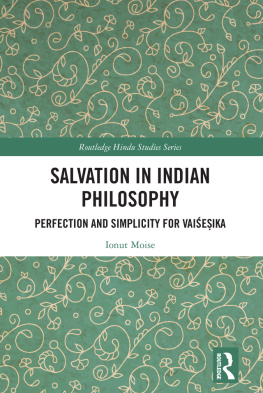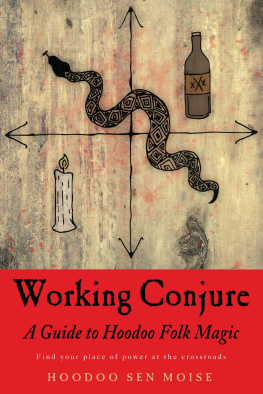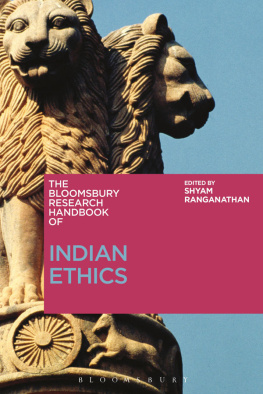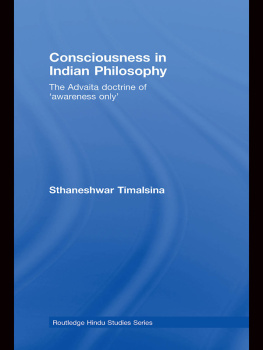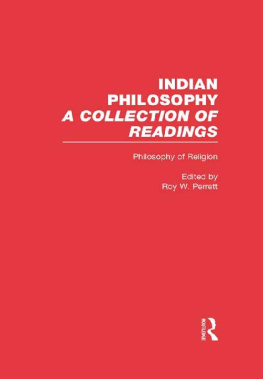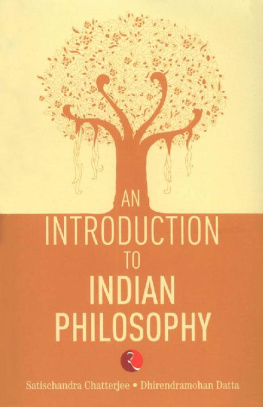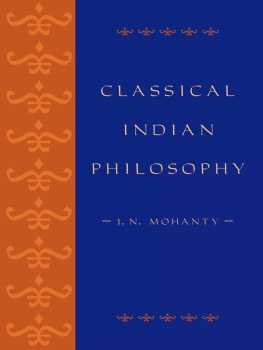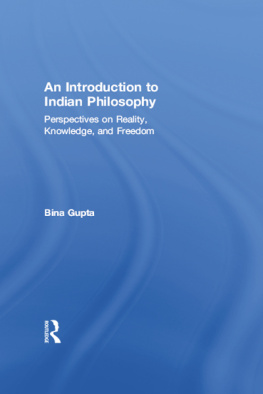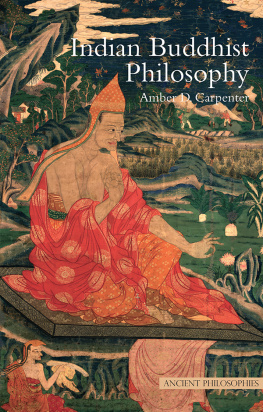Ionut Moise - Salvation in Indian Philosophy
Here you can read online Ionut Moise - Salvation in Indian Philosophy full text of the book (entire story) in english for free. Download pdf and epub, get meaning, cover and reviews about this ebook. year: 0, genre: Religion. Description of the work, (preface) as well as reviews are available. Best literature library LitArk.com created for fans of good reading and offers a wide selection of genres:
Romance novel
Science fiction
Adventure
Detective
Science
History
Home and family
Prose
Art
Politics
Computer
Non-fiction
Religion
Business
Children
Humor
Choose a favorite category and find really read worthwhile books. Enjoy immersion in the world of imagination, feel the emotions of the characters or learn something new for yourself, make an fascinating discovery.
- Book:Salvation in Indian Philosophy
- Author:
- Genre:
- Year:0
- Rating:4 / 5
- Favourites:Add to favourites
- Your mark:
- 80
- 1
- 2
- 3
- 4
- 5
Salvation in Indian Philosophy: summary, description and annotation
We offer to read an annotation, description, summary or preface (depends on what the author of the book "Salvation in Indian Philosophy" wrote himself). If you haven't found the necessary information about the book — write in the comments, we will try to find it.
Salvation in Indian Philosophy — read online for free the complete book (whole text) full work
Below is the text of the book, divided by pages. System saving the place of the last page read, allows you to conveniently read the book "Salvation in Indian Philosophy" online for free, without having to search again every time where you left off. Put a bookmark, and you can go to the page where you finished reading at any time.
Font size:
Interval:
Bookmark:

This book offers a comprehensive description of the doctrine of salvation' (nireyasa/moka) and Vaieika, one of the oldest philosophical systems of Indian philosophy and provides an overview of theories in other related Indian philosophical systems and classical doctrines of salvation.
The book examines liberation, the fourth goal of life and arguably one of the most important topics in Indian philosophy, from a comparative philosophical perspective. Contextualising classical Greek Philosophy which contains the three goals of life (Aristotles Ethics) and explains salvation as first understood in the theology of the Hellenistic and Patristics periods, the author analyses six classical philosophical schools of Indian philosophy in which there is a marked emphasis on the ultimate ontological elements of the world and self. Analysing Vaiseika and the manner in which this lesser known system has put forward its own theory of salvation (nireyasa), the author demonstrates its significance and originality as an old and influential philosophical system. He argues that it is essential for the study of other Indian sciences and for the study of all comparative philosophy.
An extensive introduction to Indian soteriology, this book will be an important reference work for academics interested in comparative religion and philosophy, Indian philosophy, Asian religion and South Asian Studies.
Ionut Moise is a tutor in Comparative Philosophy at the Oxford Centre for Hindu Studies (OCHS), University of Oxford, UK.
Series Editor: Gavin Flood
Oxford Centre for Hindu Studies
The Routledge Hindu Studies Series , in association with the Oxford Centre for Hindu Studies, intends the publication of constructive Hindu theological, philosophical and ethical projects aimed at bringing Hindu traditions into dialogue with contemporary trends in scholarship and contemporary society. The series invites original, high quality, research level work on religion, culture and society of Hindus living in India and abroad. Proposals for annotated translations of important primary sources and studies in the history of the Hindu religious traditions will also be considered.
The Goddess and The King in Indian Myth
Ring Composition, Royal Power and The Dharmic Double Helix
Raj Balkaran
Caitanya Vaiavism in Bengal
Social Impact and Historical Implications
Joseph T. OConnell, edited by Rembert Lutjeharms
Vedic Practice, Ritual Studies and Jaiminis Mmsstras
Dharma and the Enjoined Subject
Samuel G. Ngaihte
The Legacy of Vaiavism in Colonial Bengal
Edited by Ferdinando Sardella and Lucian Wong
Salvation in Indian Philosophy
Perfection and Simplicity for Vaieika
Ionut Moise
For more information about this series, please visit: www.routledge.com/asianstudies/series/RHSS
Perfection and Simplicity for Vaieika
Ionut Moise

First published 2020
by Routledge
2 Park Square, Milton Park, Abingdon, Oxon OX14 4RN
and by Routledge
52 Vanderbilt Avenue, New York, NY 10017
Routledge is an imprint of the Taylor & Francis Group, an informa business
2020 Ionut Moise
The right of Ionut Moise to be identified as author of this work has been asserted by him in accordance with sections 77 and 78 of the Copyright, Designs and Patents Act 1988.
All rights reserved. No part of this book may be reprinted or reproduced or utilised in any form or by any electronic, mechanical, or other means, now known or hereafter invented, including photocopying and recording, or in any information storage or retrieval system, without permission in writing from the publishers.
Trademark notice : Product or corporate names may be trademarks or registered trademarks, and are used only for identification and explanation without intent to infringe.
British Library Cataloguing-in-Publication Data
A catalogue record for this book is available from the British Library
Library of Congress Cataloging-in-Publication Data
Names: Moise, Ionut, 1982author.
Title: Salvation in Indian philosophy: perfection and simplicity for
Vaieika / Ionut Moise. Description: Abingdon, Oxon; New York:
Routledge, 2020. | Series: Routledge Hindu studies series | Includes
bibliographical references and index.
Identifiers: LCCN 2019042120 | ISBN 9780367420239 (hbk) | ISBN
9780367817237 (ebk)
Subjects: LCSH: Vaieika. | SalvationHinduism. | Ontology. | Moka.
Classification: LCC B132.V2 M65 2020 | DDC 181/.44dc23
LC record available at https://lccn.loc.gov/2019042120
ISBN: 978-0-367-42023-9 (hbk)
ISBN: 978-0-367-81723-7 (ebk)
Typeset in Times New Roman
by Apex CoVantage, LLC
to
Alexandru Parianu
and
Elena Leuc
mentors and everlasting friends
Referencing: In both footnotes and bibliography I have used an abbreviated form of the Oxford referencing system with only authors surname, year and date(e.g., Halbfass, 1980, p.268), and no brackets for year. For English, I have used English grammar and spelling (e.g., realise, instead of realize).
Transliteration: All Sanskrit is in roman transliteration. For Greek I have kept the original script. I have not followed the convention of putting either Sanskrit, Greek or Latin in italics. Whenever I have referred to a particular Sanskrit term in brackets, I have opted for the stem form of MW Dictionary (e.g., for karma, karman); when I have not done so, I gave a portion of the quotation. I have also used Sanskrit terminology in a more colloquial fashion (theory of karma, or the plural form 'dravyas), not least because such concepts are already consecrated within scholarship. I gave many terminological translations in brackets, e.g., substance (dravya). Sometimes I have analysed terms without even supplying a translation for these (e.g., saskra), as I consider their English rendering debatable among scholars. More generally, the diacritics of the Sanskrit authors and works referred to therein are those of the Bodleian Libraries Catalogue (SOLO) and Karl Potters Encyclopaedia.
For the Buddhist and Jain section, whose sources are in Pli and Prakrit, I have relied on scholars terminology cited, yet, I have sought to provide as much as possible the equivalent term in Sanskrit. My expertise deals only with Sanskrit sources. In the first chapter which dealt with biblical, patristic, and Greek sources, I have preferred using Greek. For the sources of New Testament, I have used Nestle-Aland Revised 28th Edition (online), for the Patristics sources I used the dictionaries referred to in the bibliography, while for the Greek philosophical references I have used The Loeb Classical Library, via LSJ (Henry George Liddell, Robert Scott, Greek-English Lexicon (online).
Candrnandas Vtti: Finally, this thesis is based on the transliteration of a critical edition made by the Hungarian scholar Ferenc Ruzsa (academia.edu). However, the shortcoming of his feat is that he worked on the 1982 edition, which Isaacson recommends to be avoided as it contains a sprinkle of new misprints; hence, in all my work have I relied on Jambvijayajis first edition (1961), which I have described and quoted throughout. The textual critical apparatus of VSc is thus based on the philological work of these two scholars, who are in the best position to supply a new critical edition of Vaieikastras for the future.
Font size:
Interval:
Bookmark:
Similar books «Salvation in Indian Philosophy»
Look at similar books to Salvation in Indian Philosophy. We have selected literature similar in name and meaning in the hope of providing readers with more options to find new, interesting, not yet read works.
Discussion, reviews of the book Salvation in Indian Philosophy and just readers' own opinions. Leave your comments, write what you think about the work, its meaning or the main characters. Specify what exactly you liked and what you didn't like, and why you think so.

